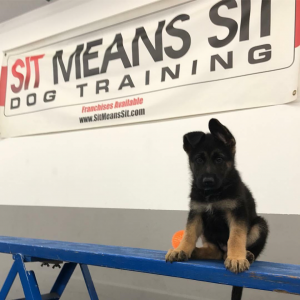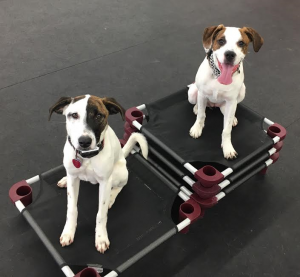New! 8 to 16 Week Old Puppies Socialization Classes!
Did you know that veterinary behaviorists identify the critical socialization period for puppies as 3 – 14 weeks old? That is why Sit Means Sit Pittsburgh offers a socialization class for puppies 8 – 16 weeks of age!

Gunner, at 9 weeks, poses on the dog walk.
Puppy Training and What Is The Best Age To Start a Puppy Socialization Classes?
What Age is Best to Start a Puppy Socialization Classes?
- Professionals specializing in dog and animal behavior believe puppies with no health problems should begin puppy socialization classes as early as 7-8 weeks old. Veterinarians, veterinary technicians, and animal behaviorists emphasize how important puppy socialization classes are and that a puppy kindergarten class will safely introduce your new puppy to other dogs and dog owners. Besides such socialization, new puppy parents will have a chance to learn about crate training, potty training, and beginner obedience training.
- Before beginning puppy training classes or being around other dogs, new canine family members need a minimum of one set of puppy vaccinations at least 7 days prior to their first puppy training class. It is your responsibility as a puppy parent to keep up to date on all vaccines through the puppy training class.
Why Is Puppy Socialization So Important?
- Puppy training and specifically a puppy socialization class are important because they help your puppy acclimate to all types of sights, sounds, smells, and other dogs positively. Using positive reinforcement training, proper socialization and a puppy training schedule can prevent a dog from being fearful of (for example) children or cars. The effort you put into training your young puppy will help them develop into a well-mannered, happy, confident dog and companion.
Puppy Socialization & Stage of Puppy Development
Curiosity Period (5 to 7 weeks)
As a puppy owner, it is important to recognize that their acceptance of people peaks as they are becoming increasingly mobile at this age. Therefore, this might be the best time for puppies to meet new people! While they might not have all their vaccinations for a puppy training class like puppy kindergarten, you can still start socialization training by meeting new people in controlled settings.
During the Curiosity Period, puppies thrive and bounce back quickly if frightened by something new. That makes this the ideal time to learn about bathing, grooming, and safe trips outside the house. You can start puppy socialization and build a puppy training schedule without attending classes!
Dog and Animal Behavior Refinement (7 to 9 weeks Old)
Puppy training and learning are permanent in this age group. Each puppy has different training needs, so a puppy training schedule should be structured on an individual basis. During this time puppies should be forming good habits, learning boundaries, and figuring out the rules of their new life. This is also a good time for a new puppy parent to introduce crate training and a potty training schedule.
Fear Imprint (8 to 11 weeks Old)
At around eight weeks old, puppies begin to be more cautious, or even fearful, of loud noises, sudden movements, strangers, and discipline from other dogs or humans. If frightened during this period it may take weeks to return to normal. In non-socialized puppies, anything associated with fear at this age will be a fearful stimuli throughout life without extensive desensitization.
That is why it is so important to fully vaccinate and attend puppy kindergarten classes during this period. When you expose your puppy to new stimuli in a safe, controlled environment, they will grow up into a confident dog! A good dog trainer will help puppy owners properly socialize their young puppies during puppy classes plus give tips for consistent training outside puppy preschool.
Environmental Awareness (9 to 12 weeks Old)
Experts on animal behavior believe that behavior can be shaped differently depending on what the owner expects from a puppy. If almost totally separated from other dogs, the human bond becomes strong. This puppy’s training is very important, especially exposure and socialization with other dogs. If puppies are properly socialized with other dogs, they might struggle with leash manners in busy areas or play styles at dog parks.
On the other hand, puppies left with littermates often have trouble with separation and/or hyperexcitability. If your family has adopted littermates, they must attend puppy classes separately so that they do not bond too closely with each other.
Consistent training during the Environmental Awareness period is crucial for socialization training! Furthermore, remember to use positive reinforcement training to continue reinforcing crate training, toilet training, and basic obedience skills.
Seniority Classification (13 to 16 weeks Old)
Dog trainers refer to the Seniority Classification puppy period as the age of independence, or more affectionately, as the Teenager Phase (much like in the human world there could several teenage phases!). Basically, this is a time when puppies begin to push boundaries by testing dominance and leadership.
Maintain firm ground rules and practice management with positive reinforcement and redirection using the tools you have learned in puppy preschool during this puppy phase. Puppies allowed to bite, dominate children, or resist such as leash training, nail cutting, and removal of food possessions are less likely to develop into a well-behaved dog.
Finally, most puppies should be fully vaccinated by 16 weeks old. This means you can start training and socializing in new places including visits to the pet store, dog-friendly restaurants, or hardware stores! It is better to avoid places like the dog park when they are this young. One bad incident with a bigger dog could lead to them exhibiting avoidance behavior, excessive fear, or reactivity.
Basic Behaviors and Life Skills to Include in Your Puppy’s Daily Training Schedule
Potty Training: One of the first things a new puppy parent wants to tackle is potty training! Reward your new puppy whenever they use the bathroom outside and keep a consistent bathroom break to help them generalize the behavior! Puppies need a predictable routine for their potty breaks.
Sleep Training and Crate Training: Helping your puppy learn where their bed gives them a safe place when you are not available. Feeling comfortable in their crate or on their bed is the first step to helping them develop into a confident adult without anxiety. Furthermore, if they ever have to be kenneled or crated at the veterinarian, having a solid foundation in crate training will ease their stress.
Appropriate Playing and Manners: Playing, chewing, sniffing, and tugging are normal puppy behaviors. However, new pet parents need to train their puppies from a young age to not be destructive. Encourage your new best friend with appropriate chew toys and puppy training games will help them develop gentle play manners.
Socialization: The best way to socialize your fully vaccinated puppy is through puppy socialization classes. A professional dog trainer will not only guide your puppy training with introductions to new things in a puppy-safe environment but also give advice on training life skills. Puppy socialization classes are not only about playing but learning to ignore exciting or scary stimuli.
Field Trips: Introduce your puppy to the world from a young age with field trips! A few examples of a puppy field trip include: a trip to the vet, a walk around the neighborhood, a visit to a pet-friendly store, meeting a friend’s dog, or strolling to the dog park. Make sure to keep young puppies safe from interactions with too many unknown dogs. Depending on their age, they might not be caught up on their puppy vaccination schedule or have a scary encounter that could set back their training.
Life Skills and Obedience Training: Puppies are constantly learning and absorbing information from a very young age. So as soon as you bring them home, you can start teaching life skills and the foundations of obedience training. Setting up firm boundaries and making sure your new dog receives puppy training appropriate for their age will ensure that they grow up into the well-behaved dog of your dreams!
What Can I Expect From Puppy Socialization Classes?
The first several weeks of socialization comes from their littermates and mother until they are sold to their new homes. Responsible breeders will not sell puppies prior to 8 – 10 weeks of age. But, not all puppies have these early weeks with littermates. The secondary phase (generally 8 – 14 weeks) happens with a puppy’s new family.
The caveat? Some pet owners are told not to socialize their puppy with other puppies or dogs until they have completed all shots – which is typically after the critical socialization period is over, around 16 weeks old. So what is more important, socialization or vaccination?
Should My Puppy Be Fully Vaccinated?
Vaccinating your puppy is important, in some cases legally required, and protects your pup from common diseases, just like vaccinations for ourselves. As trainers, we will tell you that puppies who did not get to socialize during that critical period tend to have more behavior problems (fear, anxiety, aggression, inability to play appropriately, etc).
So, we are trying to balance the importance of both socialization and vaccinations.
Keeping Puppies Safe During Puppy Training And Socialization
- A good dog training facility will make sure to make safety a top priority for puppy preschool clients. All puppies in the same socialization class should be in the same age group. Puppies playing together should have the same puppy vaccination schedule. Plus, no older puppies who are fully vaccinated and going on walks outside the home should be playing with younger puppies who have not received all their vaccines.
- While vaccines help keep dogs safe, the training space should still be disinfected before and after every class. This lowers the risk that older puppies or adult dogs from other classes might track in a virus or bacteria that could affect a younger pup’s immune system.
- Finally, when looking for puppy socialization classes, look for a responsible training facility that requires humans to disinfect their shoes before entering class, and upon re-entering. There are several diseases that could make puppies not fully vaccinated sick that can easily be tracked in by humans.

Mulligan and Zona had some off-leash social time which helped them learn body language, tone and touch with each other – a dog’s tools for communicating.
Puppy Training Schedule
We are offering a new socialization class for puppies 8 – 16 weeks of age. It costs just $60 (regardless of when you start class). Owners will learn marker training (positive reinforcement techniques) with the commands come, sit, place, down, break, heel and out. Puppies will have time to build some confidence and muscle memory on puppy-appropriate agility-type obstacles, as well as have some social time with classmates.
Classes take place on Saturday mornings at our facility 3910 Sawmill Run Blvd, Pittsburgh, 15227 from 9a-10a. It is a rolling class, so you can just show up when you are ready to attend. On any given week some puppies will be starting their first class while others will be graduating.
Please bring with you:
- your puppy on a 6-foot leash (do not bring a retractable leash)
- a copy of current vaccination records for us to keep (at least the first round, with a negative fecal test)
- small training treats or your food in a baggie (we recommend that you do not feed a full breakfast before class)
- poop bags
- your payment ($60 is due on the first day you come)
While most puppies will start this class at 10 – 12 weeks old, they will have a chance to interact with other pups that have age-appropriate vaccinations during that critical socialization period. Puppies who complete commands, have appropriate levels of confidence and have good social skills will graduate at 16 weeks and earn a Certificate of Completion. Upon graduating you can sign up for our 4-6 month old puppy class.
Benefits of Structured Socialization Classes
